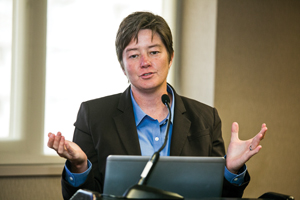Your ABA
Americans don't see their issues as legal matters, study says

Photo of Rebecca Sandefur by Kathy Anderson
Using a list of 12 common types of civil justice issues that people are likely to encounter, including employment disputes, financial and housing matters, relationship breakdowns and their aftermath, and personal injury, the Community Needs and Services Study determined that individuals seldom turn to lawyers and courts to help them find solutions.
But despite the common thinking that people don't hire lawyers due to concerns about the cost of legal services, the study findings suggest that "Americans do not take most of their justice situations to lawyers or courts for another very important reason: They do not understand these situations to be legal."
Rebecca L. Sandefur, a faculty fellow at the ABF and a law and sociology professor at the University of Illinois in Champaign-Urbana, presented the findings (PDF) during a program at the 2014 ABA Annual Meeting. The findings are based on interviews of residents across all economic and demographic spectrums during 2013 in a midsize city in the Midwest, which is not identified in the report. The interviews were a key part of the study, conducted by Sandefur and partially funded by the National Science Foundation.
"A lot of our everyday problems bump up against the law," said Sandefur, but "the law enters people's minds so seldom. They have a significantly different frame for thinking about these issues than we do."
DISSATISFYING OUTCOMES
The study found that the most common method for dealing with civil justice situations is self-help, which was used by 46 percent of the survey participants. Another 16 percent of the survey participants said they do nothing to address the situations they face, and 16 percent said they seek help or advice from family members or friends. Only 15 percent said they seek help from a third-party adviser or representative, which might include clergy members, elected officials, social workers and government agencies, as well as lawyers and courts.But outcomes were not often satisfying for the random sampling of adults in the study. Sixty-six percent of the participants reported experiencing at least one of the 12 categories of civil justice situations during the 18 months before being interviewed for the study, but 47 percent of the situations they experienced brought negative outcomes, such as adverse effects on their health, loss of income and verbal or physical violence or threats of violence.
ABA President William C. Hubbard, a partner at the Nelson Mullins law firm in Columbia, South Carolina, has made closing the gap in delivering civil legal services his top policy priority for the coming year.



